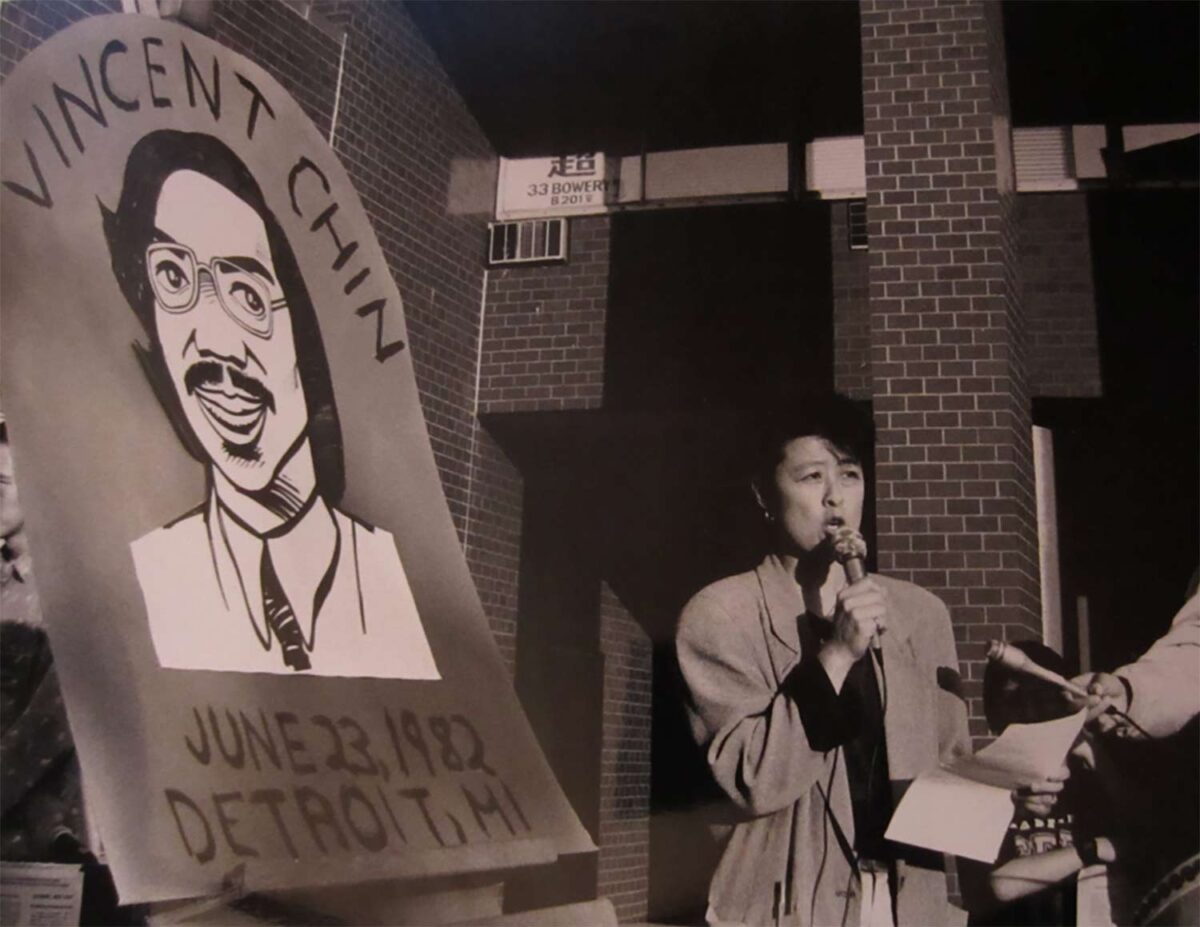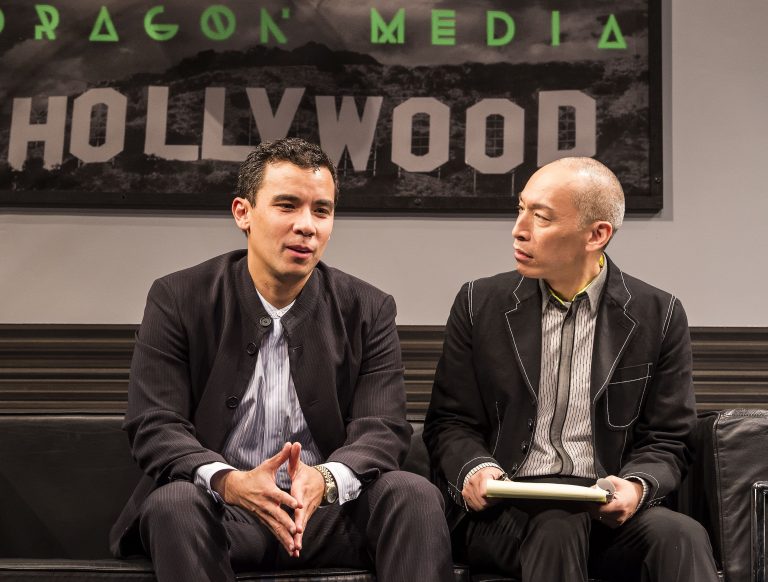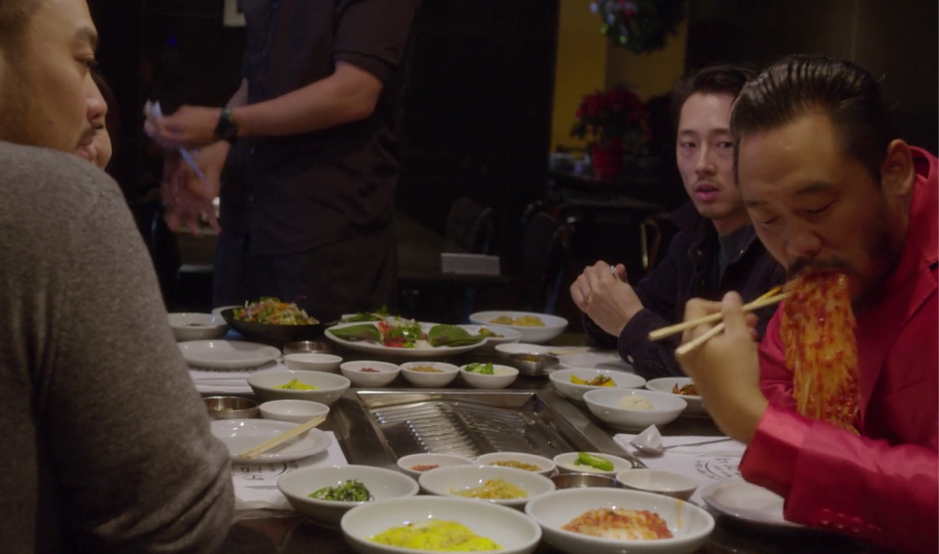This post was updated on 5/29/21 to include new developments in this story, including comments from A-Major Media. This post was updated on 6/3/21 to include new comments by Annie Tan and Rosalind Chao.
Earlier this year, it was announced that Gemma Chan would be partnering with A-Major Media and M88 to produce a new star-studded podcast centered around the 1982 racially-motivated murder of Vincent Chin that sparked a nationwide protest galvanizing the Asian American community. That podcast — Hold Still, Vincent — involves a table read of a screenplay by the same name written by Johnny Ngo, and it features a star-studded cast of Asian American actors including Remy Hii as Vincent Chin, Rosalind Chao as Vincent’s mother Lily Chin, and Kelly Marie Tran as both Liza Chan and Helen Zia. Benedict Wong, Ki Hong Lee, Stephanie Hsu and Tzi Ma also make appearances. The podcast also features an interview with Asian American artists and activists moderated by John Cho. Hold Still, Vincent released all five episodes on May 27, and is also expected to be developed into a feature film.
Both podcast and film have excited the Asian American community because they are expected to introduce a pivotal moment in Asian American movement history to a wider audience. Many were disappointed therefore when Helen Zia — the journalist who played a central role in organizing the demands for justice for Chin and his family — revealed that neither she nor the Vincent Chin Estate have ever been contacted by the makers of Hold Still, Vincent.
“I’m not dead yet and it’s weird hearing/seeing myself fictionalized by people who have never tried to connect with me or the [Vincent Chin] Estate.”
Helen Zia
In 1982, 27-year-old Chinese American Vincent Chin was brutally murdered by two white auto workers in Detroit, Michigan who had earlier mistaken Chin for Japanese American and who called him racist slurs as they bludgeoned him into a coma with a baseball bat. Chin died a few days later, having never recovered consciousness. Neither of Chin’s killers ever served a day in jail, and were only fined $3,000 for his death. Zia, who was working as a journalist in Detroit, helped lead the massive grassroots effort that united the Asian American community alongside other activists of color in seeking justice for Chin and his family. Although Chin’s killers largely escaped justice, the Chin case has become a watershed moment for the Asian American community and helped birth modern federal and state hate crime laws.
Today, Zia is still an outspoken Asian American, feminist, and LGBTQ activist, and she dedicated a chapter of her book Asian American Dreams to her work in the Chin case. She also remained close to the Chin family including after Lily Chin’s death in 2002, even while the Chin Estate continued to seek settlement payments owed to them following a successful civil suit against Chin’s killers. Zia remains an inspiration to many for her central role in the momentous fight for justice for Vincent Chin, even as she has always humbly lifted up others who organized alongside her. Many in the Asian American community therefore naturally assumed that she had been in communication with the creators of Hold Still, Vincent during the production of that podcast, and were shocked to learn otherwise.
“To my friends who are sending congrats to me for the new Vincent Chin podcast — I don’t know anyone associated with this project and have never been contacted by them. Nor has the Estate of Vincent and Lily Chin,” said Zia on Instagram. “Creators — please at least check in with community people who lived these experiences, including the estate of Lily and Vincent Chin — the AAPI community and its activists deserve that respect.”
“I’m not dead yet and it’s weird hearing/seeing myself fictionalized by people who have never tried to connect with me or the Estate,” Zia added.
Educator and Asian American activist Annie Tan, who is a member of Chin’s extended family and who has written reflections on the impact of Chin’s killing, also confirmed that – at least to her knowledge – her family had not been contacted by the creators of Hold Still, Vincent.
In an interview with Reappropriate, Tan added that she was shocked that Zia and members of her family weren’t contacted.
“Helen was on the front lines of that movement work,” said Tan, who emphasizes that she speaks only for herself and is not an official spokesperson for the Chin family or Estate. “When people like Helen Zia are being spoken for who can still speak for themselves, the very first thought when thinking to dramatize them should be to center their voices when writing the characters.”
Tan added on Twitter that she found it difficult to listen to Hold Still, Vincent, for its stated fictionalization of the Chin murder for dramatic effect.
“Honestly, the title is triggering to me as a cousin,” said Tan on Twitter.
Many on Twitter expressed disappointment that Hold Still, Vincent had not reached out to Zia and the Chin family, even if just as a courtesy. Some confessed that it caused them to have new reservations about supporting the project.
“Lily Chin entrusted her family’s legacy with Helen, who was like a daughter to her,” said filmmaker Renee Tajima-Peña, who produced the 1987 documentary Who Killed Vincent Chin that was later nominated for the Academy Award for Best Documentary Feature. “Out of respect for Lily’s memory, I hope [the makers of Hold Still, Vincent] reach out to the people who lived this story and were instrumental in the movement for justice for Vincent.”
“Out of respect for Lily’s memory, I hope [the makers of Hold Still, Vincent] reach out to the people who lived this story and were instrumental in the movement for justice for Vincent.”
Renee Tajima-Peña
Despite the controversy, both Zia and Tan still offered their measured support for the Hold Still, Vincent project and other Hollywood efforts to make the Vincent Chin case more widely known. Several television and film projects on the Chin case are currently rumored to be in the works, and Zia is attached to a TV series currently in development.
“I want more people to know about this case,” said Tan. “I understand it will get fictionalized over time without active participation from the family most impacted: the story belongs to everyone. At the same time it’s important when stories are told to center the voices of those most impacted, that they actually build up the diverse representation most needed now and so make storytelling now and in the future great and life-changing. I hope in the future this helps other storytellers tell “truth” in its many facets and which honors the lived experiences of those who witnessed it.”
“Such an important story deserves to be told and every American should know about what happened to Vincent Chin and about this multiracial, multicultural Asian American-centered civil rights movement,” said Zia on Instagram. “I hope these various Hollywood projects get the stories right about the AAPI community, because the lessons of the Vincent Chin justice movement are critical to countering today’s tsunami of anti-Asian hate.”
On May 29, two days after Zia’s revelation, A-Major Media apologized on Instagram for failing to contact Zia and the Vincent Chin Estate during podcast production. They further announced that they were disabling downloads of Hold Still, Vincent and that they would be offering to pull down the podcast permanently depending on the wishes of Zia and the Vincent Chin Estate, whom they say they have since contacted.
The full text of A-Major Media’s statement is below:
On behalf of the producers, we profoundly apologize to Helen Zia and the Vincent Chin Estate for our oversight during the making of HOLD STILL, VINCENT. We are deeply sorry to all the generous partners who came together to donate their time and bear no responsibility for our mistake – Gemma Chan, our incredible cast, QCODE, Phillip Sun (M88), Carmen Cuba and Gold House – as our only motivation was to share Vincent’s story with the world. We are in contact with Helen Zia and the Vincent Chin Estate and have offered to take the podcast down. In the meantime, we are disabling the podcast out of respect for Helen and the Estate and will be guided by their wishes.
Actor Rosalind Chao — who plays Lily Chin in Hold Still, Vincent — also commented on Twitter acknowledging the controversy.
“I hear your and [Helen Zia’s] frustrations,” she wrote. “Given the current climate there was perhaps an urgency to get Vincent’s story to the forefront ASAP. Please know that we all jumped on at a moment’s notice with the best intentions. Hoping to bring the community together not divide.”
Less than a week after this story broke, actor/producer Gemma Chan and producer Mary Lee of A-Major Media spoke with Tan. According to Tan, Chan and Lee said that the intention for Hold Still, Vincent was “solely to tell the story of Vincent Chin and Asian American history, not meant to profit, and that any proceeds would go back to Asian American communities.”
“However, due diligence should have been paid,” wrote Tan in a statement after her conversations with Chan and Lee. “[T]he respectful and bare-minimum steps [would have been] to reach out to Vincent and Lily Chin’s family, to [Vincent Chin’s fiance at the time of his murder] Vikki’s family, and to Helen Zia who are alive and can speak for themselves. As a storyteller, I know seeking truth is hard and takes time and labor. But if we’re to tell the stories that matter with integrity, we have to do the work, and that means reaching out to those most impacted.”
Tan shared in her statement that the Chin family had already endured disrespect from other journalists, including some who had “hounded” the family and who had never returned borrowed family photos. In that context, Hold Still, Vincent‘s failure to reach out to the Chin family and to Helen Zia is all the more frustrating for Tan.
“I and many of my friends and family members were immediately triggered by the title — Hold Still, Vincent — completely traumatizing given that my cousin Vincent Chin was literally held down by Michael Nitz while beaten by Ronald Ebens,” wrote Tan. “I listened to the first episode to fictionalized accounts of how my cousin Vincent may have sounded with his then-fiancé Vikki and my great-auntie Lily. Then I listened to a scene with a lion dance, which never happened, that overlayed (sic) the beating of drums with my cousin simultaneously beaten to death by a baseball bat. Perhaps these fictionalized events may not have appeared in the screenplay or podcast if my family or Helen were reached out to; I will never know.”
“I implore the producers and writers of the podcast to apologize with the truth of what happened and make amends with integrity. I hope Hollywood and storytellers everywhere take this lesson on what diversity, representation, and stories should and should not look like.”
Annie Tan
“I implore the producers and writers of the podcast to apologize with the truth of what happened and make amends with integrity. I hope Hollywood and storytellers everywhere take this lesson on what diversity, representation, and stories should and should not look like,” added Tan.
Read Tan’s full statement here.
This post will continue to be updated as this story develops.
This story was based on my tweets here.



